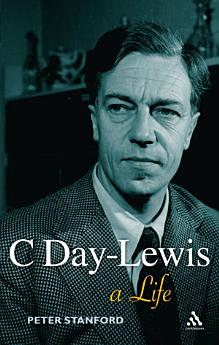C Day-Lewis: A Life
মে’ ২০০৭ · Bloomsbury Publishing
২.০star
১ টা পৰ্যালোচনাreport
ইবুক
384
পৃষ্ঠা
reportমূল্যাংকন আৰু পৰ্যালোচনা সত্যাপন কৰা হোৱা নাই অধিক জানক
এই ইবুকখনৰ বিষয়ে
How unfair', wrote one national newspaper in 1951, 'that accomplishments enough to satisfy the pride of six men should be united in Mr Day-Lewis.' Poet, translator of classical texts, novelist, detective writer (under the pen-name Nicholas Blake), performer and, at that time, Professor of Poetry at Oxford, C Day-Lewis had many careers all at once. This first authorised biography tells the private story behind the many headlines that this handsome, charming Anglo-Irish Poet Laureate generated in his lifetime.
With unparalleled access to Day-Lewis's archives and the recollections of first-hand witnesses, Peter Stanford traces the link between life and art to reassess the work of a poet lauded in his lifetime but whose literary reputation has latterly become a matter of controversy with Westminster Abbey refusing him the place in Poets' Corner traditionally allotted to Poets Laureate.
Day-Lewis first made his name as one of the 'poets of the thirties', launching a communist-influenced poetic revolution alongside WH Auden and Stephen Spender that aspired to spark wholesale political change to face down fascism.
In the 1940s, 'Red Cecil', as he had become known, broke with communism and Auden and went on to produce some of his most popular and enduring verse, prompted by his long love affair with the novelist, Rosamond Lehmann. Torn between her and his wife, he reflected on his double life in verse and became for some the supreme poet of the divided heart. Later, with his second wife, the actress Jill Balcon, he promoted poetry with a series of popular recitals and radio and television programmes. Together, they had two children, Tamasin and Daniel, later an Oscar-winning actor.
Day-Lewis was always pulled between a fulfilling domestic life and a restless desire to explore. His travels, his exploration of his Irish roots and his infidelities are all part of the rich and many-faceted life that Peter Stanford describes.
It is, however, as a poet that he is best remembered, and the poetry itself, often autobiographical, forms an integral part of this intriguing and long-overdue biography.
With unparalleled access to Day-Lewis's archives and the recollections of first-hand witnesses, Peter Stanford traces the link between life and art to reassess the work of a poet lauded in his lifetime but whose literary reputation has latterly become a matter of controversy with Westminster Abbey refusing him the place in Poets' Corner traditionally allotted to Poets Laureate.
Day-Lewis first made his name as one of the 'poets of the thirties', launching a communist-influenced poetic revolution alongside WH Auden and Stephen Spender that aspired to spark wholesale political change to face down fascism.
In the 1940s, 'Red Cecil', as he had become known, broke with communism and Auden and went on to produce some of his most popular and enduring verse, prompted by his long love affair with the novelist, Rosamond Lehmann. Torn between her and his wife, he reflected on his double life in verse and became for some the supreme poet of the divided heart. Later, with his second wife, the actress Jill Balcon, he promoted poetry with a series of popular recitals and radio and television programmes. Together, they had two children, Tamasin and Daniel, later an Oscar-winning actor.
Day-Lewis was always pulled between a fulfilling domestic life and a restless desire to explore. His travels, his exploration of his Irish roots and his infidelities are all part of the rich and many-faceted life that Peter Stanford describes.
It is, however, as a poet that he is best remembered, and the poetry itself, often autobiographical, forms an integral part of this intriguing and long-overdue biography.
মূল্যাংকন আৰু পৰ্যালোচনাসমূহ
২.০
১ টা পৰ্যালোচনা
লিখকৰ বিষয়ে
Peter Stanford is a writer, broadcaster and biographer, whose books include biographies of Lord Longford, C Day-Lewis, and the Devil and the travelogue, The Extra Mile. A former editor of the Catholic Herald, he writes for The Daily Telegraph, The Independent on Sunday and The Observer and has a regular column in The Tablet. www.peterstanford.co.uk
এই ইবুকখনক মূল্যাংকন কৰক
আমাক আপোনাৰ মতামত জনাওক।
পঢ়াৰ নির্দেশাৱলী
স্মাৰ্টফ’ন আৰু টেবলেট
Android আৰু iPad/iPhoneৰ বাবে Google Play Books এপটো ইনষ্টল কৰক। ই স্বয়ংক্রিয়ভাৱে আপোনাৰ একাউণ্টৰ সৈতে ছিংক হয় আৰু আপুনি য'তে নাথাকক ত'তেই কোনো অডিঅ'বুক অনলাইন বা অফলাইনত শুনিবলৈ সুবিধা দিয়ে।
লেপটপ আৰু কম্পিউটাৰ
আপুনি কম্পিউটাৰৰ ৱেব ব্রাউজাৰ ব্যৱহাৰ কৰি Google Playত কিনা অডিঅ'বুকসমূহ শুনিব পাৰে।
ই-ৰীডাৰ আৰু অন্য ডিভাইচ
Kobo eReadersৰ দৰে ই-চিয়াঁহীৰ ডিভাইচসমূহত পঢ়িবলৈ, আপুনি এটা ফাইল ডাউনল’ড কৰি সেইটো আপোনাৰ ডিভাইচলৈ স্থানান্তৰণ কৰিব লাগিব। সমৰ্থিত ই-ৰিডাৰলৈ ফাইলটো কেনেকৈ স্থানান্তৰ কৰিব জানিবলৈ সহায় কেন্দ্ৰত থকা সবিশেষ নিৰ্দেশাৱলী চাওক।







